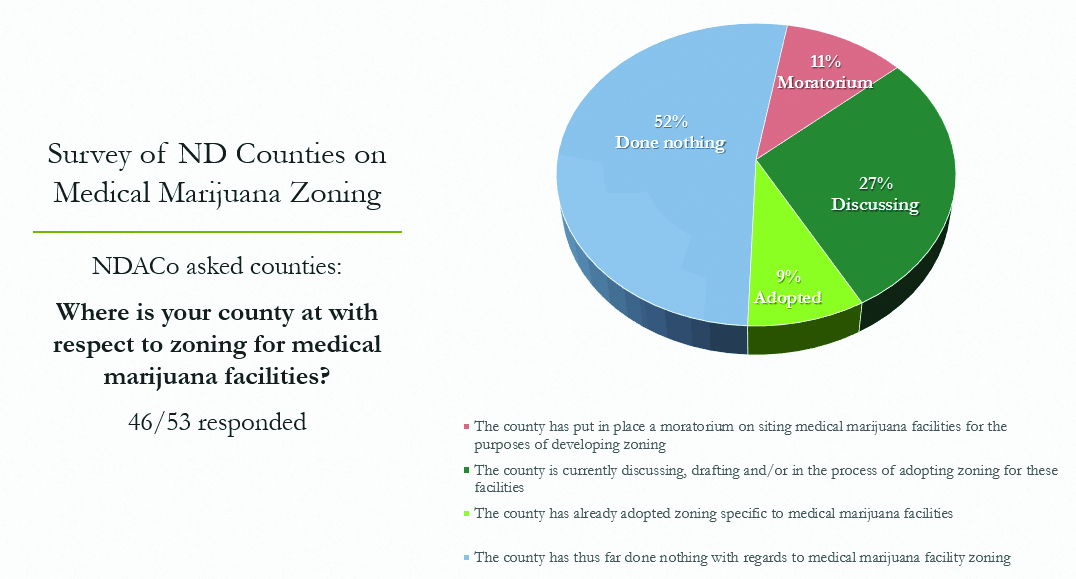Few Counties Have Addressed Medical Marijuana Zoning

According to a recent North Dakota Association of Counties Survey, a majority of North Dakota counties have done little in adopting zoning ordinances to address regulating medical marijuana manufacturing and distribution centers. Of the 46 counties who responded to the survey, only the four counties of McKenzie, Morton, Cavalier and Ward have adopted an ordinance. Numerous counties are discussing, drafting or in the process of adopting an ordinance and a handful of counties have placed a moratorium on siting facilities until a zoning ordinance is developed.
 “It is critical counties create a zoning ordinance that will ensure the safety of our citizens and the businesses associated with medical marijuana. Counties need to be proactive,” said McKenzie County Planning Director Jim Talbert. “Without zoning regulations in place prior to the approval of a distribution or manufacturing facility to locate in a county, there is nothing the local government can do to regulate the locations or other characteristics of manufacturing or distribution facilities without legal ramifications. The ordinance approved in McKenzie County sets criteria for such things as location, lighting, fencing, security, and the distance from schools and homes.”
“It is critical counties create a zoning ordinance that will ensure the safety of our citizens and the businesses associated with medical marijuana. Counties need to be proactive,” said McKenzie County Planning Director Jim Talbert. “Without zoning regulations in place prior to the approval of a distribution or manufacturing facility to locate in a county, there is nothing the local government can do to regulate the locations or other characteristics of manufacturing or distribution facilities without legal ramifications. The ordinance approved in McKenzie County sets criteria for such things as location, lighting, fencing, security, and the distance from schools and homes.”
“NDACo has been an advocate for protecting the ability of local government to make its own local regulatory decisions. It is important for counties to be proactive by working on these issues now, prior to businesses seeking approval from cities and counties,” said NDACo Executive Director Mark Johnson. “NDACo has been working with our County officials over the past year to prepare and educate them on the implementation of medical marijuana in North Dakota.”
ND Counties Submit Comments on Proposed Rules
NDACo recently held a webinar to discuss the importance of counties adopting ordinances regulating the medical marijuana manufacturing and dispensaries. The webinar was also used to educate county members on the North Dakota Department of Health (DOH) proposed rules for medical marijuana.
NDACo organized a group of county officials who represent various departments who will be involved and impacted by the implementation of medical marijuana to review the rules. NDACo then prepared comments and submitted them in person at a public hearing December 13th. The response represented statewide county perspective and the interests of the various county departments.
The comments submitted focus on three proposed rules. First, counties are asking for clarification on a rule that as written requires law enforcement to report all marijuana violations. We assume this rule is meant to only require reporting of medical marijuana. Secondly, counties are recommending that local public health departments also be notified of adverse reactions to medical marijuana. And thirdly, counties suggest that a manifest should be carried in a vehicle when transporting medical marijuana.
Voters last November passed Measure 5, legalizing medical marijuana. The North Dakota Legislature replaced the law with their own version of guidelines which added more controls and limitations to the compassionate care act. The law allows for only two manufacturing facilities and eight distribution centers. Businesses interested in operating a medical marijuana facility or distribution center must have approval from local officials prior to applying for registration with the DOH. Only qualified patients or registered care givers who have a medical marijuana registration card will be legally allowed to purchase and possess medical marijuana. The DOH has said the soonest the rules could go into effect is April 1, 2018. They anticipate medical marijuana to be available to registered qualifying patients within the first quarter of 2019.
The study group is made up of Cass County Commissioner Chad Peterson; McKenzie County Planner Jim Talbert; SW District Health Administrator Sherry Adams; Morton County Tax Director Linda Morris; McKenzie County State’s Attorney Chas Neff; Ward County State’s Attorney Roza Larson; Grant County Sheriff John Foss; Burleigh County Sheriff’s Department Major Gary Schafer; Richland County Social Services Director Kristen Hasbargen; and NDACo Staff Terry Traynor, Aaron Birst, Donnell Preskey and Mary Korsmo.